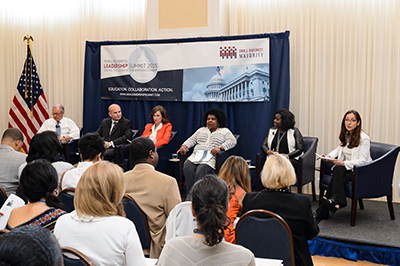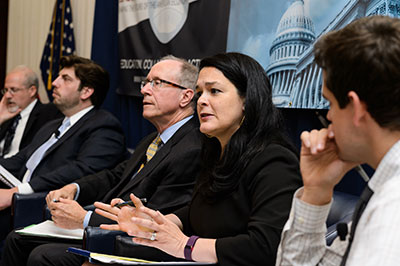2015 Summit Panels
Access to capital: The key to entrepreneurship and economic development
Panelists:
- Amy Cortese (moderator), Journalist & Founder, Lovecasting Media
- Connie Evans, President & CEO, Association for Entrprise Opportunity
- Joyce Klein, Director, Aspen Institute Microenterprise Fund for Innovation, Effectiveness, Learning and Dissemination (FIELD)
- Catarah Coleman, Co-owner, Southern Girl Desserts, Los Angeles, CA
- Patrick Kelley, Deputy Chief of Staff, Small Business Administration
- Richard Neiman, Head of Regulatory and Government Affairs, Lending Club
Small, local businesses are forces for economic development—creating opportunity in the neighborhoods where they operate by providing jobs that lead to income growth and helping revitalize challenged areas far more than chain businesses. Studies show independent stores recirculate 52% of their revenue locally, compared to 16% of national chain stores’ revenue. Women and minority-owned businesses, especially, are a burgeoning economic force in our country, but one that could be stronger and more transformative if provided the proper tools needed to cultivate their businesses.

Small business owners and policy experts discussing barriers to access to capital for small businesses
In the post-recession environment, small entrepreneurs continue to struggle to access the capital they need to start, run and grow their companies from the country’s traditional lenders. But the high-tech world sees this as an opportunity. Powered by increasing algorithmic sophistication and the unlimited reach of the Internet, a new breed of lenders is emerging to serve this market. The development of online lending holds the potential to get needed capital to entrepreneurs and to communities that have long been underserved, but it must proceed responsibly. However, this new breed of lending brings with it its own set of problems—unscrupulous actors who would take advantage of small business owners solely to pad their own pocketbooks. Not all online lenders are equal and some mask very high rates.
This panel looked at the hurdles small businesses must overcome to access capital, expanded opportunities that exist with traditional lenders, the new class of online lenders making their way into the small business sphere, and how we can protect small businesses from unscrupulous lenders while getting them the capital they need to thrive.
Taxes, budget and the economy: Creating the environment for small businesses to thrive
Panelists:
- J.D. Harrison (moderator), Small Business Reporter, Washington Post
- Bill Beach, Chief Economist for the Senate Budget Committee, republican Staff
- Prof. Caroline Bruckner, Executive-in-residence, Accounting and Taxation Managing Director, Kogod Tax Center Kogod School of Business, American University
- Evan Schatz, Staff Director for Ranking Member Patty Murray, U.S. Senate Committee on Health, Education, Labor & Pesions
- Mike Brey, Owner, Hobby Works, Laurel MD
- Mike Roach, Co-owner, Paloma Clothing, Portland, OR
To ensure a strong and vibrant economy, policymakers must take a host of concrete steps that create the solid financial foundation small businesses need to succeed. For instance, the nation’s tax code must create opportunities for small businesses and encourage startups and entrepreneurs. To do that, we must take steps to create incentives for small business to thrive, level the playing field, simplify the tax code and ensure fairness. We also must create a stronger infrastructure, both physical and digital, which is critical to driving business growth, entrepreneurship and job creation.

Tax policy experts and members of Small Business Majority’s Small Business Council discussing tax policies that impact small businesses
Infrastructure investments like broadband support the growth of a vibrant freelance and entrepreneurial economy that relies on the Internet for access to markets, customers and services to support operations. Likewise, investing in the nation’s roads, bridges and other physical infrastructure also support access, while at the same time creating demand opportunities for the goods and services small businesses have to sell.
Moreover, we must enact policies that nurture our modern 21st century prosperity, including the growth of our freelance economy, the important role played by microenterprises and the key role that new technologies play in small business’ opportunities. And, we must ensure that entrepreneurs and their employees are able to build wealth and otherwise prosper in our ever-changing economic landscape.
This panel tackled broad tax and economic policies lawmakers should be pushing that directly impact small businesses.
